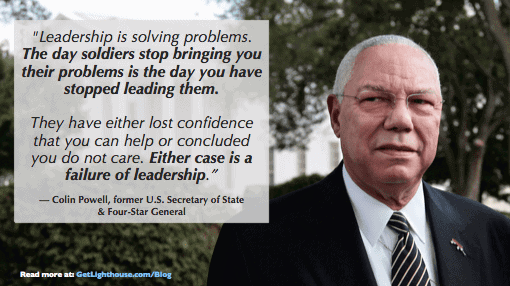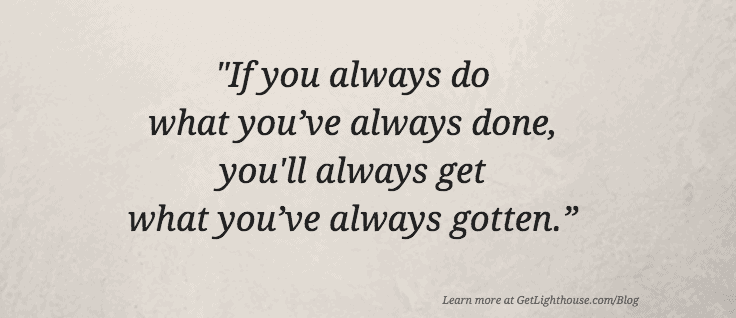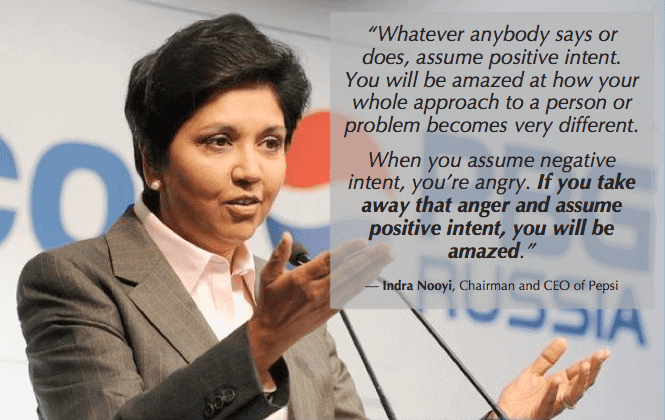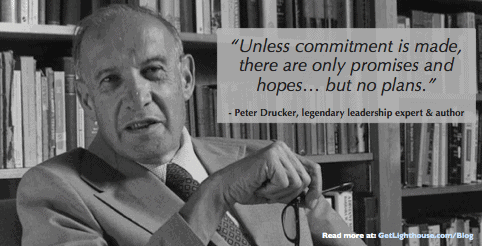Are you getting good feedback from your team? Or do they always quickly agree with anything you say and tell you everything is "good” when you ask?
If you're like most managers, you probably wish you could get more team feedback. Quality feedback can help you all work better together, improve your leadership style, and ensure you catch issues before they become major problems.

Do you get enough feedback from your team?
What if despite your best efforts, your team is not coming to you with feedback as often as you'd like? How can you get your team to give you more feedback?
While your team members have to be the ones to come up with the feedback, there are many things you can do to make them more comfortable and effective at giving it. Here's 6 approaches you can start using today with your team.
6 Approaches to Help You Get More Feedback from Your Team
A good manager takes accountability for the results they want.
If you want more feedback from your team, then you should first focus on the actions you can take to make it happen. These tactics will help you do your part to make your team more likely to give you the feedback you crave:
Approaches for Getting More Feedback from Your Team
- Create psychological safety
- Ask for feedback
- Be grateful and accepting of feedback
- Take action
- Use reciprocity
- Lead by example
When You Should Ask for Feedback from Your Team Members
- After Completing Important Projects
- After Onboarding New Team Members
- Right after the End of a Quarter
- When Employees Leave the Company

1) Build psychological safety with them
When researching the secrets behind their best-performing teams, Google found out that those with an open-minded culture, or psychological safety, were more likely to achieve success in a project.
Simply put, psychological safety is defined as the ability to, "show and employ one's self without fear of negative consequences of self-image, status, or career."
When your team has psychological safety, they will feel free to express their ideas and opinions. While they all won’t be amazing ideas, the point is that you’ll hear all of them. The best ideas will be heard and won, while no messengers will be shot.
Without it, receiving feedback from your team becomes practically impossible. Why would anyone share feedback with someone they fear?
How you can build a foundation of psychological safety for your team
If you want your team to express themselves freely to give you more feedback, here are a few things you can do:
- Hire for cognitive diversity on your team. Cognitive diversity is defined in Harvard Business Review as differences in "perspective or information processing styles." Researchers Lewis and Reynolds concluded that cognitively diverse teams tend to perform better than those who think alike. Hire people who have different perspectives on ideas and give everyone the freedom to express themselves, they’ll have an easier time opening up to you for feedback and sharing great ideas in team meetings.
- Be aware of how your attitude and actions affect your workplace. A controlling attitude, impulsiveness, and negativity will rub off on your team and stop them from sharing feedback with you. On the other hand, if you’re more open-minded, communicative and accepting of what they have to say, they’ll feel more comfortable sharing their thoughts (and feedback) with you.
- Make sure your team practices psychological safety, too: It’s great for you to encourage psychological safety on your team, but if members of your team trash their peer’s ideas, then it’s not going to work. Make sure you call out any inappropriate comments, and correct any issues between members to maintain psychological safety.
By nurturing psychological safety, you'll create a strong foundation for exchanging feedback with your team. You'll also make it much easier to follow the rest of the steps on this list.
Further reading:
- Learn why psychological safety is so important for the health and success of your team and other ways to implement it on your team
- Build up your self-awareness in management to improve many aspects of your leadership skills.

2) Ask!
Have you asked your team specifically for feedback lately? There's a big difference between thinking you want feedback and directly asking for it.
It's like the important lesson that Ed Catmull learned when he was running Pixar in the early days. He thought having an "open door policy" would help him hear everything he needed to. He was wrong.
As he recalled in his book, Creativity, Inc, he had to ask. Only then did he hear what he needed to.

Ask for specific feedback.
If you want more feedback from your team, you have to ask them.
And don't just take the easy route and ask things like, "Do you have any feedback for me?" That's vague and difficult to know what you really want without context.
Instead, ask them good, specific questions like:
- How could we change our team meetings to be more effective?
- Would you like more or less direction from me on your work?
- What could I do to make you enjoy your work more?
- Do you feel your ideas are heard by the team and I?
- What part of the day do you have the most energy and focus? What changes could we make to accommodate this?
By getting specific, you make it easier for them to give you more feedback. There's a big difference between wanting feedback on the way you run meetings, and how you handled the departure of a low performing teammate.
Being specific in your request for feedback also makes you more effective. A vague question can give you a random set of answers, which makes it hard to tell what is affecting everyone or just one person.
Instead, if you ask everyone the same question, you can triangulate the feedback to see what problems are most important, and which ideas have the most buy in already.

3) Be grateful and accepting of feedback
Think about the last time you gave someone tough feedback. Did they immediately accept it? Or, did they debate and challenge you on it?
Chances are they were at least a little defensive at first. If they were very defensive, you probably now think twice before giving them feedback again.
If you're defensive with your team giving you feedback, don't be surprised if they hesitate to give you feedback in the future, too.

Assume positive intent.
Think of team feedback as a gift. They cared enough to share it with you, so that things can get better for both of you.
Some pills are harder to swallow than others, but it doesn't change the fact the intent is to help. Even if it wasn't delivered in the most friendly manner, you can still learn from it. This is one of the many reasons Indra Nooyi, CEO of Pepsi, preaches looking for the positive intent in what happens.
Next time you get feedback from a team member, try this approach to ensure you continue getting feedback from them:
- Pause and thank them for the feedback before you say anything else.
- Ask them to share a recent situation where the feedback applies.
- Ask clarifying questions to ensure you understand the core of their feedback.
- Talk about possible solutions or changes with them, or explain the context they need to know.
Getting team feedback isn't always a pleasant experience. However, with a little practice and an open mind, you can make your team more comfortable giving you feedback. This then makes them more likely to want to give you more feedback in the future, too.

4) Take action on team feedback
When you get feedback from your team, your work is just beginning. They shared feedback with you, because they want to see things change. Otherwise, why bother sharing it?
Remember the Progress Principle we've talked about many times here on the Lighthouse blog:

If something is important enough to bring up as feedback to their manager, it's something they want to see progress on. If they don't feel progress made on it, it will be discouraging.
A manager who doesn't do anything with the team feedback they receive is unlikely to get more in the future, nor have an engaged team for the long term.
Turn feedback into action.
When you get feedback from employees, take a few minutes to discuss the next steps, too. Work together on what, if anything can be done. This makes them feel heard, and helps them understand right away what progress may happen related to their feedback.
Every situation will be a little different in how to handle their feedback, so let's work through a few scenarios:
- You change something: Your actions will validate their courage to give you feedback.
- They change something: You empower them to help create the kind of company that want to work for.
- You explain why it is that way: When you can't change something, helping them understand why it is that way can help them empathize and better tolerate things.
Whether you can fix exactly what they're worried about, or can only manage their expectations on the situation, talking about what can or cannot be done is a crucial step. Don't let a discussion on feedback end without it.
What can I do if my team still resists?
Asking directly for feedback, being grateful, and taking action are great fundamentals to getting it. However, sometimes that's not enough.
Sometimes there are issues on your team making them not open to giving feedback right now. A lack of trust or rapport, resentment, or past history can all cause it.
These last two approaches can help turn around some of your more shy, resistant, or quiet team members.

5) Use reciprocity
Are you giving your team feedback? Are you doing things they want or would appreciate? If not, you must learn about the power of reciprocity.
Reciprocity is built deep into the psyche of all of us. If you give someone a gift or do something for them, they'll feel indebted to you and are more likely to return the favor, or do something else requested by you of similar value.
A famous study in the 1970s demonstrated its power:
"In 1971, Dennis Regan tested the strength of these two aspects of reciprocity in a study... During the experiment, Joe would disappear and bring back a soft drink for the participant. After this phase of the experiment was over, Joe would ask the participant to buy raffle tickets from him.
The more the participants liked Joe, the more likely they were to buy raffle tickets from him.
However, when Joe had given them a soda and thus indebted them to reciprocate, it made no difference whether the participants liked Joe or not."
Reciprocity overrides feelings.
Robert Cialdini started the modern work of persuasion and behavioral economics with his best-selling book, Influence: the Psychology of Persuasion. He devoted an entire chapter of his book to reciprocity. The most telling story he shared on this principle takes us back to World War I.

A German soldier was sneaking across the trench-filled battlefield to capture and kill opposing troops. One time, he surprised a soldier eating dinner. What happened next is stunning proof of reciprocity's power:
"The frightened captive, with only a piece of bread in his hand, then performed what may have been the most important act of his life. He gave his enemy some of his bread. So affected was the German by this gift that he could not complete his mission.
He turned from his benefactor and recrossed the no man's land empty-handed to face the wrath of his superiors."
If reciprocity can save a soldier's life, it can certainly work for you. Even if you don't have a great relationship with everyone on your, while you work to fix that, reciprocity can help get you more team feedback.
To paraphrase a great former U.S. President: Ask not what your team can do for you; ask what you can do for your team. Whether it's some feedback, well-deserved praise, or something else they want, it's likely to then in turn get them to give you more feedback.

6) Lead by example
There is nothing more important than the example you set as a leader. You are always on stage. Your team is watching what you do much more than what you say.
If you want feedback to be a key part of your team's culture and regular habits, then you have to lead by example. Here's a few ways to do that:
- Give them feedback and praise: As discussed above, it creates an opportunity for reciprocity, and is a good habit in general to motivate your best people, and improve everyone.
- Hold blameless postmortems and project reflections: When a big problem happens, or a major project finishes, take time to meet as a team to talk about what went right and wrong, and what to do differently next time. It's a great way to get everyone to be introspective and thoughtful about improvement.
- Own up to your own mistakes: If you show that feedback is valued and you change because of it, they're more likely to do the same. If you're open to constructively criticizing yourself, it makes others more open to it as well.
The habits you create on your team can make all the difference in whether you get more feedback. As you build more of them, listen closely to your team; they may have even more good ideas to make feedback a key part of your team's culture.
When You Should Ask for Feedback from Your Team Members
Knowing the right time to ask for feedback is key to getting quality insights from your team. While you want regular feedback, there are certain situations that lend themselves to more open and thoughtful responses from your team.
As important as the “right” time to ask is, it’s even more important to avoid the bad times to ask for feedback. These include circumstances like:
- Right after a stressful project or deadline: Their minds are likely in other places and they’re tired from a big push. Give them time to recuperate before asking.
- In the middle of working overtime and focused on other tasks: Don’t ask your team for feedback on something unimportant if they’re hyper focused on a task at hand.
- Too long after the event, project, or situation: Asking your team about something over 6 months ago will lead to vague, general feedback. Even longer will be even less helpful to you, and disappointing to your team who find it pointless.
Yes, it’s a bit like Goldilocks; not too late, not too soon. Yet, if you get in the right habit, you’ll find it’s easy to ask for feedback and just the right time.
Here’s a few of the best times to ask for feedback:
After Completing Important Projects
Conducting project retrospectives (also known as “Post-Mortems” or “Retros”) allows you to get valuable insights that can improve how you and your team work together.
In these meetings, you discuss with everyone who was on the team for the recent project to uncover what went well and what could be improved.
To maximize what you learn, it’s best to hold meetings like these shortly after completing the project. This balances not stressing and distracting your team while they’re focused on delivering the project, and also having the discussion while it’s still in the front of everyone’s minds.
If you do these frequently and on a recurring basis as you complete projects, and take action based on the best ideas and feedback that come out of each meeting, you’ll find your team will get better and better, and morale is likely to improve as well; everyone enjoys working on a team that fixes problems and invests in continuous improvement.
One other note: If you have any major problems or controversies during a project, you may want to supplement your group post mortems by asking team members privately for feedback; they may share things 1 on 1 that they will not share in a big public meeting (and may not be appropriate to).
After Onboarding New Team Members
The first few weeks in their new roles are crucial for setting up your new team members for success. Studies show companies with strong onboarding have higher revenue, lower turnover, and faster new employee productivity (who doesn’t want all of that!?).
Remember: if you don’t onboard someone well, there’s a good chance they’ll leave or not work out. Either way, it costs as much as 6-9 months of an employee's salary just to replace them according to the Society for Human Resource Management. Yet, Gallup found only 12% of employees think their company does a great job with onboarding.
As a manager, you can improve onboarding for your team in a variety of ways. One of the best is to check in with your new hires regularly during their first few weeks to get feedback on their experience. This allows you to course-correct early and build an open feedback culture from the start. You also will learn what to do differently for any hire thereafter.
If you’re not part of that 12% of companies with great onboarding and want to do better, read our guide on how to improve your employee onboarding process to engage your new hires and prevent turnover.
Right after the End of a Quarter
Doing a quarterly check with your team is a great way to get insights on what's working well and what needs attention to fix things. It’s also often a time when you and your team are wrapping up OKRs, KPIs, or delivering on key initiatives, so right after that deadline is a great time to check for feedback.
Much like we discussed the benefits of getting feedback after a big project is completed, checking in after closing a quarter or fiscal year is a great time to ask for feedback. This can allow you to adjust your planning processes, goal setting, and other rituals based on what you hear from your team.
It’s important to make these discussions where your team feels psychologically safe; to effectively learn what can be improved around these issues, you need to foster an open discussion where people feel safe constructively criticizing anything, even leadership decisions. Focus the tone on learning and improving together, and do your best to not be defensive, even when it’s not all good news, or hits close to home for you.
Most importantly, don't forget to take notes, so you can recognize common themes and follow up one-on-one with team members to get additional context. Later, you can then use these notes to go over suggested changes with your manager, or make the appropriate changes yourself; discussions are helpful, but what your team is really looking for is change and improvement.
When Employees Leave the Company
If someone is leaving your organization, it’s natural for you to want to interview your departing team member to understand why they're quitting. But exit interviews often yield little as people don't want to burn bridges and prefer leaving on a high note.
As explained in detail in our guide on stopping employee turnover waves, the better approach is to have an open discussion with your remaining team. You need to find out any issues they have before you leave too; chances are, what made one person decide to leave is also felt by those that remain, and you can still save them.
Most importantly, whatever you hear from both the person leaving and especially those remaining, you need to take action on. Notice any common themes surfaced in these discussions, because even small changes to address frustrations can go a long way.
Keep in mind: Your goal isn't to interrogate every departure. It's to proactively listen to your existing team and create an environment where people want to stay. Prevent future turnover and boost team morale (who may be disappointed by the departure) by being responsive now to those still invested in your shared success
Conclusion
Getting anything good to happen on your team takes effort. If you are intentional and deliberate about creating a great team environment, getting more team feedback is just one of many positive habits you can create.
Further Reading:
Looking to learn more about feedback, praise, and creating a great culture on your team? Here's some great posts to read next:
- 5 fresh, new ways to give better feedback
- How to ask for feedback from your manager
- How to give effective praise to motivate your team
- The most important thing to create a great culture
- The unfiltered truth about company culture
Are you growing as a leader? Are you building the skills you need?
Whether your team is in office with you or remote, Lighthouse Lessons can teach you the skills you need to better lead, motivate, and grow your team. Let us help you navigate the unique challenges of being a leader like we helped Daniel by learning more and signing up here.





